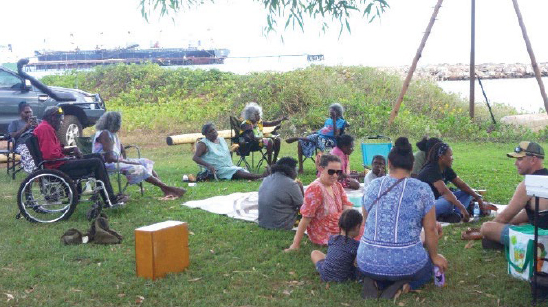The panel’s vision
First Nations’ concepts of disability and care should be recognised and embedded across all support systems for people with disability. To improve outcomes for First Nations people with disability, there must be more accessible, inclusive, safe and culturally informed supports and services. Different approaches to building supply are needed in remote communities, which could also create permanent jobs.

What is the problem?
“Disability” is a Western concept and word that does not easily fit into First Nations communities and languages. First Nations people with disability experience the compounding effects of both racism and ableism. While this impacts all First Nations people with disability, there are additional impacts on First Nations women, Elders, LGBTIQA+SB communities and those living in regional, rural and remote locations.
Many reviews and inquiries have shown that First Nations participants, their families and remote communities find the focus on individually funded disability services at odds with First Nations culture and values, which place family and community supports first. We have also heard that many First Nations people with disability and their families find the NDIS complex and confusing, and hard to navigate.
We have heard services are not available at all or only infrequently. Fly in-fly out or drive in-drive out services do not meet people’s needs. Services are often not culturally sensitive and First Nations people don’t feel safe using them. Some people with disability living in remote communities feel they have to leave the NDIS to get support for daily living activities such as meals, showers and home cleaning from the aged care service provider. But then they lose access to NDIS supports, such as assistive technology. This is not fair and must change.
Back to topWhat is the solution?
First Nations people with disability and communities should have access to more culturally accessible and safe services. Instead of relying on markets to deliver, governments should work with First Nations communities and remote communities to coordinate and purchase supports. We call this ‘alternative commissioning’.
We recommend the National Disability Insurance Agency, in partnership with First Nations representatives' communities, participants and relevant government agencies should progressively roll-out alternative commissioning arrangements for both First Nations communities and remote communities, starting as soon as possible. This should include exploring opportunities for integrated commissioning across health and aged care, as well as disability.
Alternative commissioning approaches should be designed and rolled out in genuine partnership with communities and their community-controlled organisation, building on their existing strengths and capabilities.
Governments should ensure they meet their commitments under the National Agreement on Closing the Gap when working in partnership with communities. Place-based, community-led approaches should contribute to Closing the Gap by strengthening the community-controlled sector and creating a more sustainable, localised workforce.
What does “alternative commissioning” of supports mean?
Community or place-based alternative commissioning arrangements should mean:
- First Nations communities have more access to culturally safe supports, including in towns and cities. They should choose and control how disability services work for their community.
- All people in remote communities should be able to access supports where they live.
- More support should be delivered by people who are part of community, instead of having to rely on people who travel in and out.
- All supports – such as foundational supports, navigation supports or aged care – should be joined up so that they work together across the community.
- Communities and governments can learn together about which approaches and options work best.
Who will this benefit?
First Nations people with disability and their families will have access to more culturally safe, quality supports and services across a connected disability support system. Supports and services designed and delivered by organisations that are trusted by First Nations communities will strengthen the community-controlled sector and improve outcomes for First Nations people and communities.
Back to topWhat happens next?
We know you might be worried about what this will mean for you. We strongly recommend that First Nations people with disability, their families, communities and representative organisations are fully engaged in designing and testing the changes to make sure they work well. We also recommend that they should be introduced gradually so everyone has time to get ready.
Back to top